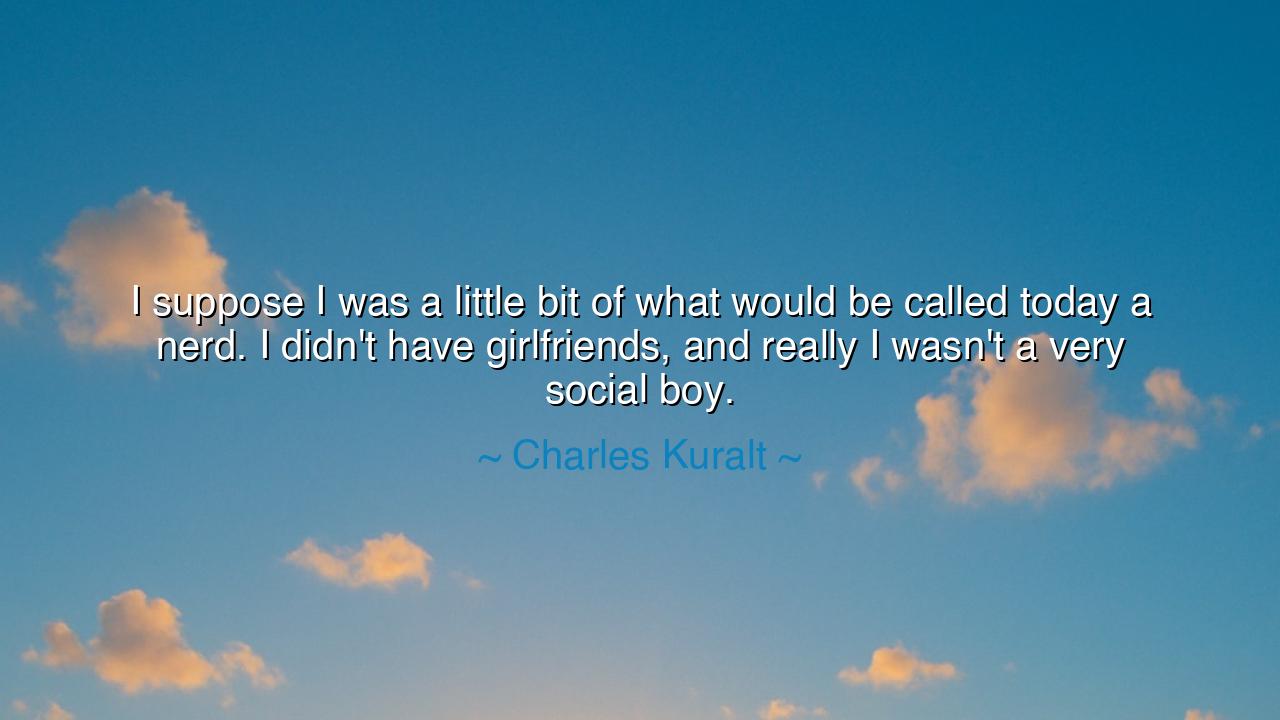
I suppose I was a little bit of what would be called today a
I suppose I was a little bit of what would be called today a nerd. I didn't have girlfriends, and really I wasn't a very social boy.






“I suppose I was a little bit of what would be called today a nerd. I didn't have girlfriends, and really I wasn't a very social boy.” Thus spoke Charles Kuralt, the quiet observer of America, the man whose voice carried the warmth of a front porch conversation and the depth of a wandering sage. In these simple words, he confesses not weakness, but solitude chosen by temperament—the kind that nurtures thought, imagination, and a love for the unseen beauty of ordinary life. His words remind us that greatness is often born not in the crowded halls of popularity, but in the still corners where a young soul learns to listen—to the wind, to the silence, and to itself.
Kuralt, known for his tender and human storytelling on On the Road, spent much of his youth as a quiet observer rather than a participant. His admission that he “wasn’t a very social boy” reveals a truth that echoes through the ages: those who are destined to understand humanity often begin by standing apart from it. For solitude, though misunderstood, is the soil in which perception takes root. The so-called “nerd,” mocked by the world for his stillness, often sees what others rush past. He studies, he dreams, he asks questions that pierce beneath the surface of things. It is through such inward living that Kuralt learned to see the poetry in the commonplace and the sacred in the simple.
In the annals of history, the pattern repeats itself. Isaac Newton, that lonely scholar of light and gravity, spent his youth isolated from his peers, absorbed in the quiet pursuit of knowledge. He once said, “If I have seen further, it is by standing on the shoulders of giants,” but before he ever climbed upon those shoulders, he spent countless nights alone, contemplating the mysteries of the heavens. Like Kuralt, Newton was not the life of the party—he was the life of the mind. The world may not have called him social, but it called him genius, and his solitude became the bridge by which humanity crossed into understanding.
Kuralt’s confession also speaks to the eternal misunderstanding between the inward and the outward soul. Society often rewards noise, charisma, and visibility, while overlooking the quiet strength of contemplation. Yet, the ancients knew better. The philosopher Socrates, though often mocked in the streets of Athens, taught that wisdom begins with the admission of one’s own ignorance—and such admission requires introspection, humility, and silence. The young Kuralt, by spending his early years in quiet observation, was not avoiding life—he was preparing to see life deeply. His solitude was not absence, but apprenticeship.
There is also tenderness in his words, a self-awareness free from bitterness. “I didn’t have girlfriends,” he admits without shame, as though to say: I was not ready then for the world of hearts and gestures, for I was still learning my own heart. Many youths, desperate for belonging, lose themselves in imitation; but Kuralt’s honesty reveals that authenticity blooms best in patience. To grow alone is not to be unloved—it is to be unhurried by the demands of imitation. The fruit that ripens slowly carries the richest sweetness.
Let us then draw from Kuralt’s example a lesson for all who feel out of place in the noise of the world. If you find yourself without a crowd, without applause, without the easy companionship of many—do not despair. The quiet life has its own sacred rhythm. Use your solitude to sharpen your sight, to listen more deeply, to know yourself. For the one who understands himself becomes capable of understanding all others. And when your time comes to speak, as it did for Kuralt, your words will carry the stillness of truth that only silence can teach.
Kuralt’s “nerd” is thus not a symbol of exclusion, but of preparation. He reminds us that solitude is not loneliness, but the forge of insight. The world may call it awkwardness; wisdom calls it discipline. The youth who watches rather than boasts, who listens rather than performs, will one day tell stories that remind the restless world to pause, to breathe, to notice. Such was Kuralt’s gift to us.
So, my children of the modern age, remember this: do not be ashamed of your quiet nature. In every age, it is the watchers, not the talkers, who leave the truest legacy. Be patient in your solitude. Let it make you kind, thoughtful, and perceptive. For the day will come when the world, weary of its own noise, will turn to you—and you will speak with the calm authority of one who has known silence and learned its wisdom. Then, like Charles Kuralt, your stillness will become your strength, and your once-lonely road will become a light for others to follow.






AAdministratorAdministrator
Welcome, honored guests. Please leave a comment, we will respond soon